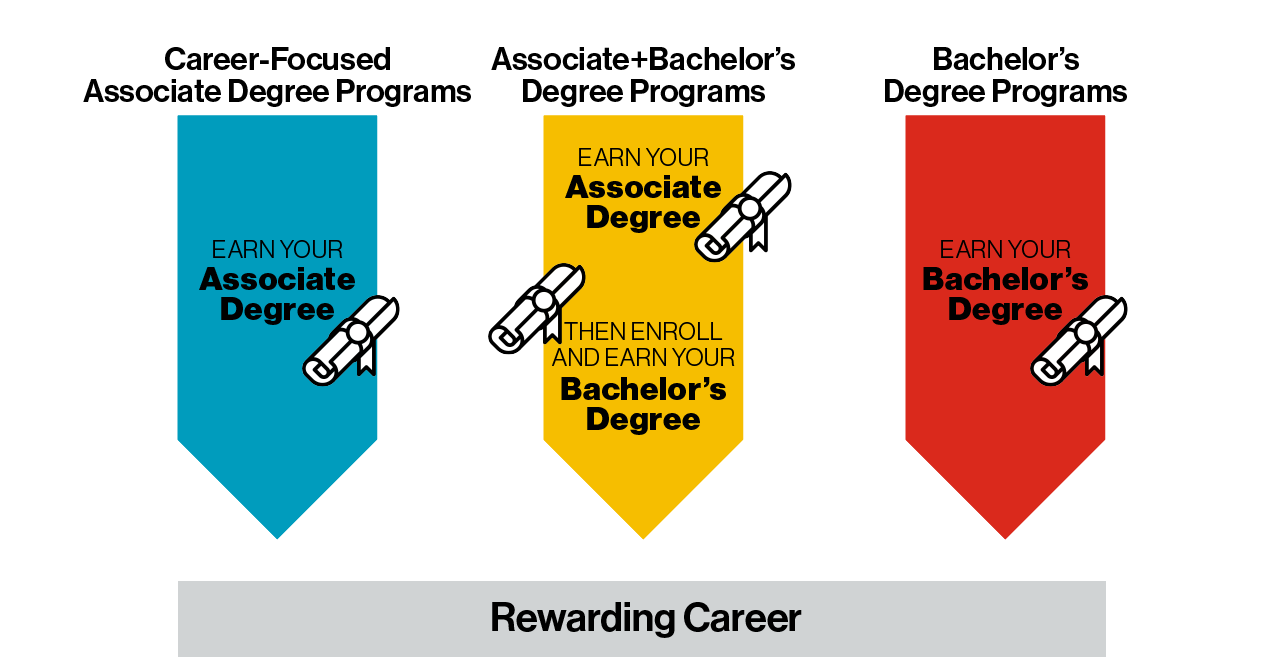Transfer Admission


Transfer Admission
- RIT/
- National Technical Institute for the Deaf/
- Admissions & Aid/
- Transfer Admission
585-475-6700 (voice)
585-743-1366 (videophone)
ntidadmissions@rit.edu
Your Strong Start Deserves a Spectacular Finish

RIT students thrive in an environment rich with hands-on learning, customizable experiences, and global opportunities. We celebrate each student’s unique path and provide them tools for success. Don’t just take our word for it—RIT is nationally recognized for excellence.
Visit and Events
We have opportunities every day to come to campus or visit virtually! Get to know RIT/NTID, meet our students and staff, and ask questions. Students who attend one of these visit opportunities will have their application fee waived.
RIT/NTID Spring Open House
Visit campus on April 18 or April 25 to meet faculty, tour campus, and ask your questions.
Meet us on campus or virtually
Attend an info session, event, or schedule a campus tour.
Vocational Rehabilitation Overview
7 p.m. ET
Monday, March 17, 2025
Get an overview of VR and how it can help deaf and hard-of-hearing students plan and finance a college education.
Financial Aid Session
7 p.m. ET
Wednesday, March 19, 2025
Learn about reduced tuition, scholarships, tips on navigating financial aid forms, and more.
Student Panel: Ask Us Anything!
7 p.m. ET
Tuesday, April 8, 2025
Current students will take center stage and share their experiences, ready to answer any questions about student life, academics, and access services.
These Open Houses will highlight NTID’s associate-level programs, associate+bachelor's degree programs, and pre-baccalaureate programs for deaf and hard-of-hearing students. We also will have a program for students interested in the ASL-English interpretation and community development and inclusive leadership bachelor's degree programs.
The day will begin at 8:30 a.m. and will go until 4:00 p.m.
| Friday, April 18, 2025 | Register Now |
| Friday, April 25, 2025 | Register Now |
Transferring Credits
How Transferring Credits Works
- You can use our transfer credit equivalency tool to understand how your credits may transfer.
- After you apply and if you are accepted, we will provide an official transfer credit evaluation.
- College-level coursework with grades with grades of C or better can be considered for credit.
- For a comprehensive overview of transfer credit policies, please refer to information provided by the RIT Registrar.
Determine How Your Credits Will Transfer
Check out the Transfer Credit Equivalency Tool to gain a clearer understanding of how your transfer credits may be awarded.
With this tool, you can:
- See which of your courses transfer to RIT
- Research which courses you should take to satisfy RIT requirements
Courses not listed in the database will be evaluated for transfer credit upon your acceptance to RIT. If you have a question about a specific course you do not see listed, please contact the admissions office at ntidadmissions@rit.edu.
Transferring in Test Credits
Send all Advanced Placement (AP), Cambridge A-Levels (GCE), College-Level Examination Program (CLEP) and International Baccalaureate (IB) test results directly to the Office of Undergraduate Admissions. When taking these exams, make sure to designate RIT as a receiving school.
Academic Preparation and Requirements

Learn more about the variety of academic opportunities available to deaf and hard-of-hearing students at RIT.
Most students applying to RIT choose a specific major as part of the admission process. In addition, undecided career exploration programs are available to explore major options, and the School of Individualized Study can help you design a major around your interests if they don’t fit into a single degree program or college. Given the variety of majors, admission requirements and entrance exam score ranges will vary from one major to another. For all bachelor’s degree programs, a strong performance in a college preparatory program is expected. Generally, this includes 4 years of English, 3-4 years of mathematics, 2-3 years of science and 3 years of social studies and/or history.
See specific math and science requirements and other recommendations
Applying for Admission
Start an Application
Applying to RIT is simple! You have two options: the RIT Application or the Common Application. On your application, you will select a first-choice major, and if applicable, a second and third choice.
-or-
Manage an Application
Within the RIT admissions portal, you can monitor your application, submit a portfolio (if required), apply for the Performing Arts Scholarship, receive your admissions decision, and more.
If you need to change your submitted application, do not submit a new application. Please email ntidadmissions@rit.edu with your request (e.g. change academic program choices, change your term, withdraw application, etc).
Transfer Application Checklist
-
Complete the Common Application or RIT Application
-
Request official academic transcripts from all colleges you have attended (even if only one class).
Transcripts may be sent electronically to NTIDadmissions@rit.edu.
If you or your school would prefer to mail them, please send to:
RIT/NTID Office of Admissions
52 Lomb Memorial Drive
Rochester, NY 14623-5608 -
If you have completed fewer than 30 semester hours (45 quarter hours) at the time of your application, your final high school transcript is required.
-
SAT/ACT scores are optional. Ask your test center to send us your official SAT/ACT scores if you wish us to consider your test scores..
-
Deaf and hard-of-hearing applicants need to submit one recommendation. Ask the individual writing the letter to send the letter to RIT/NTID Admissions or you can upload the letter to your application. The author of the letter should be someone who is familiar with your work in school, for example, a school counselor, a teacher or a coach.
-
Submit an essay that talks about why you want to transfer to RIT. The personal essay helps us to become acquainted with you as a person and student, apart from courses, grades, test scores and other objective data. It will also demonstrate your ability to organize your thoughts and express yourself. The essay questions are included in the application.
-
Deaf and hard-of-hearing applicants, including those with cochlear implants, need to submit an audiogram as part of the application process. The audiogram should include all hearing test results and etiology, along with the requisite provider signature. Uploaded files should be in PDF format, and we cannot accept photographed copies. Audiograms can also be emailed to NTIDAdmissions@rit.edu or faxed to 585-475-2696.
Every deaf and hard-of-hearing student is an RIT student. Some study in associate degree programs within the College of NTID at RIT and some in bachelor's degree programs at one of RIT's eight other colleges. In all cases, RIT/NTID receives funding from the federal government for deaf and hard-of-hearing students. An audiogram is needed to determine eligibility for the reduced tuition rate. The audiogram has no role in determining academic admissibility.
-
International Applicants Only - Students whose native language is not English must submit results of the TOEFL, IELTS or PTE Academic examination. Deaf and hard-of-hearing students only need to take the reading and writing components. Testing can be self-reported. Frequently Asked Questions for International Applicants
-
An Art Portfolio is required for admission to the School of Art, School of Design, and School of Film and Animation. (A portfolio is not required for admission to our School of Photographic Arts and Sciences unless an applicant is seeking transfer credit for completed coursework in photography.)
When to Apply
Try to Apply by Priority Deadlines: Priority deadlines secure space in academic programs and provide the needed time to complete your enrollment before your first semester at RIT.
Missed the Deadline? Not a Problem! We accept applications after deadlines on a rolling, space-available basis. Questions? Contact ntidadmissions@rit.edu.
Fall
Application Priority Deadline:
February 11
Recommended FAFSA Submission Deadline:
February 1
Decision Notification:
Rolling 2
Deposit Deadline:
May 1
Spring
Application Priority Deadline:
November 1
Recommended FAFSA Submission Deadline:
November 1
Decision Notification:
Rolling
Deposit Deadline:
December 1
1 Fall applicants to the Physician Assistant (BS/MS) program must have all application material in by December 1.
2 Fall applicants to the following programs will receive admission decisions starting in mid-March: Biomedical Engineering, Chemical Engineering, Mechanical Engineering, Computer Science, Cybersecurity, Film & Animation, Diagnostic Medical Sonography, Physician Assistant (BS/MS), or Game Design and Development and programs within the School of Design.
3 Select programs admit for Summer term. Contact ntidadmissions@rit.edu if you have any questions about enrolling in Summer.
Financial Aid and Scholarships
RIT/NTID receives support from the federal government, and as a result, deaf and hard-of-hearing students enrolled in any undergraduate degree program pay less than one-half of RIT’s tuition. The reduced tuition rate also applies for students enrolled in the American Sign Language-English Interpretation program.
Deaf and hard-of-hearing students enrolled in graduate degree programs also pay a reduced tuition rate. At RIT/NTID, we pride ourselves on making a great education truly affordable.
Financial Aid and Scholarships
Estimated Cost of Attendance (see Deaf and Hard-of-Hearing and Hearing NTID-Supported Students)
Vocational Rehabilitation (VR)
You might not be aware that your state’s Vocational Rehabilitation office is an important resource available to you to help you plan and finance a college education. VR offices exist in every state, and VR counselors work with high schools, junior colleges and universities across the country to help students who are deaf or hard of hearing or who have disabilities get the education they need for career success. VR may assist with vocational training or college.
VR services may include financial assistance, employment planning, counseling, transportation, and job placement assistance. A VR counselor, who determines eligibility for services, is assigned to each individual requesting assistance. States have various names for VR, and services vary depending on need and the state in which a student lives.
If you have questions related to VR or financial aid, contact a member below.
Denise Hampton
Assistant Director
Vocational Rehabilitation Services
585-475-2582 (V)
dchsfa@rit.edu
Barbara Polle
Coordinator, NTID Student Financial Services
585-475-6863 (voice/TTY)
585-286-5516 (VP)
blpnod@rit.edu
Heather Johnson
Assistant Director, NTID
Office of Financial Aid & Scholarships
Rochester Institute of Technology
56 Lomb Memorial Drive, Rochester, NY 14623
585-475-2186
ritaid@rit.edu
Matthew Reynell
Assistant Director, NTID
Office of Financial Aid & Scholarships
Rochester Institute of Technology
56 Lomb Memorial Drive, Rochester, NY 14623
585-475-2186
ritaid@rit.edu
International Students
RIT/NTID is an exceptional college choice for deaf and hard-of-hearing students from all countries.
RIT/NTID provides excellent academic programs, outstanding access and support services, and diverse educational, social and personal development opportunities that you won't find anywhere else in the world. If you're looking for a superior education and a truly unique college experience, you'll find it here at RIT/NTID.
Among RIT's 18,000 students are hundreds of international students, including nearly 100 deaf and hard-of-hearing students from countries in Africa, Asia, Europe, and North and South America.
RIT/NTID has welcomed students from countries around the world, including deaf and hard-of-hearing students from places like Australia, Bolivia, Canada, China, Czechoslovakia, Dominican Republic, Ethiopia, France, Germany, Greece, Haiti, Hong Kong, India, Japan, Mexico, Nigeria, Pakistan, Philippines, Russia, South Korea, Spain, Thailand, Uganda, United Kingdom, Vietnam, and others!
Contact Admissions

We're here to help
If you have questions or would like to request more information, get in touch.
585-475-6700 (voice)
585-743-1366 (videophone)
ntidadmissions@rit.edu
Meet Your Admissions Counselor
Lyndon Baines Johnson Hall
52 Lomb Memorial Drive
Rochester, New York 14623
Getting to Admissions and Aid
Staff Directory






